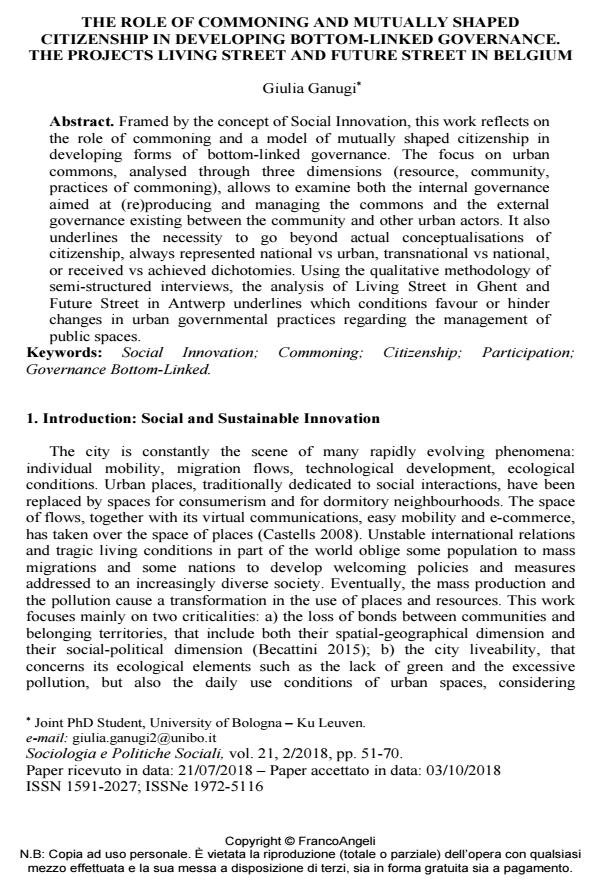The role of commoning and mutually shaped citizenship in developing bottom-linked governance. The projects living street and future street in Belgium
Journal title SOCIOLOGIA E POLITICHE SOCIALI
Author/s Giulia Ganugi
Publishing Year 2018 Issue 2018/2
Language English Pages 20 P. 51-70 File size 244 KB
DOI 10.3280/SP2018-002003
DOI is like a bar code for intellectual property: to have more infomation
click here
Below, you can see the article first page
If you want to buy this article in PDF format, you can do it, following the instructions to buy download credits

FrancoAngeli is member of Publishers International Linking Association, Inc (PILA), a not-for-profit association which run the CrossRef service enabling links to and from online scholarly content.
Framed by the concept of Social Innovation, this work reflects on the role of commoning and a model of mutually shaped citizenship in developing forms of bottom-linked governance. The focus on urban commons, analysed through three dimensions (resource, community, practices of commoning), allows to examine both the internal governance aimed at (re)producing and managing the commons and the external governance existing between the community and other urban actors. It also underlines the necessity to go beyond actual conceptualisations of citizenship, always represented national vs urban, transnational vs national, or received vs achieved dichotomies. Using the qualitative methodology of semi-structured interviews, the analysis of Living Street in Ghent and Future Street in Antwerp underlines which conditions favour or hinder changes in urban governmental practices regarding the management of public spaces.
Keywords: Social Innovation; Commoning; Citizenship; Participation; Governance Bottom-Linked.
- Co-Design and Co-Production of Public Service. The Prevention of Childhood Obesity in Reggio Emilia — Italy Andrea Bassi, Giulia Ganugi, Riccardo Prandini, in Polish Political Science Review /2021 pp.71
DOI: 10.2478/ppsr-2021-0013 - “Making Slow Path”. The Arts-Based Event “Gebermte” as an Act of Commoning Sofia Saavedra Bruno, Lavinia Isan, Wossen Gebreyohannes Balcha, Pieter Van den Broeck, in Frontiers in Sustainable Cities 743570/2022
DOI: 10.3389/frsc.2022.743570 - Fostering social cohesion at the neighbourhood scale: the role of two Social Streets in Ferrara and Verona Giulia Ganugi, Riccardo Prandini, in SN Social Sciences 105/2023
DOI: 10.1007/s43545-023-00688-6 - Urban Living Laboratories and hybrid-bottom-linked governance: lessons from food actions in Turin Alessandra Manganelli, Luca Battisti, in ARCHIVIO DI STUDI URBANI E REGIONALI 141/2025 pp.149
DOI: 10.3280/ASUR2024-141008
Giulia Ganugi, The role of commoning and mutually shaped citizenship in developing bottom-linked governance. The projects living street and future street in Belgium in "SOCIOLOGIA E POLITICHE SOCIALI" 2/2018, pp 51-70, DOI: 10.3280/SP2018-002003